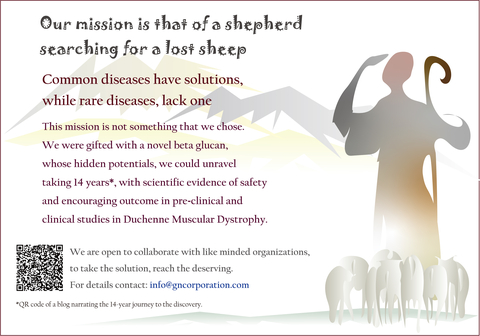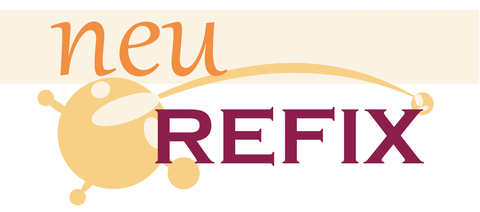Neu-REFIX Beta glucan receives rare pediatric disease and orphan drug designations from the US FDA for treatment of Duchenne Muscular Dystrophy
Neu-REFIX Beta glucan receives rare pediatric disease and orphan drug designations from the US FDA for treatment of Duchenne Muscular Dystrophy
Rare diseases research provides insights into auto-immune diseases and Psoriasis.
The parable of the lost sheep mirrors our journey to find a solution for Duchenne Muscular Dystrophy (DMD), a rare disease. Our global interdisciplinary team is fortunate to have been gifted with Neu REFIX, whose hidden potentials of beneficial immune modulation, we unravelled by extensive preclinical and clinical studies. This gives hope to DMD patients for its potentials in improving their quality of life by halting the disease progress. Like the shepherd when he found the lost sheep, our joy knew no bounds, when we got encouraging outcome in DMD research. Now on receiving orphan drug and rare paediatric disease designations from US FDA, while it’s time to rejoice, we have miles to go until it reaches every deserving patient after an approval, the final goal. We are open to collaborate with likeminded institutes to reach the goal. Further insights have revealed the potentials of Neu REFIX in Psoriasis, auto-immune diseases and in Multiple Sclerosis by gut microbiome reconstitution. (Graphic: Business Wire)
TOKYO--(BUSINESS WIRE)--Neu REFIX Beta glucan, made in Japan has received both Rare Pediatric Disease Designation (RPDD) and Orphan Drug Designation (ODD) from the U.S. Food and Drug Administration (US FDA) for treatment of Duchenne muscular Dystrophy (DMD). These designations would help take the progress in pre-clinical and clinical studies conducted in Japan and India to clinical trials in the USA, for approval by FDA.
The Neu-REFIX Beta 1,3-1,6 glucan, is an exo-polysaccharide produced by N-163 strain of Aureobasidium Pullulans, available as an orally consumable, allergen-free, food supplement, that has proven to be safe, with the following potentials in DMD:
- Stand-alone efficacy in reducing skeletal muscle inflammation and fibrosis in mdx mice
- Enhancement of muscle regeneration in mdx mice in a duration of 45-days
- Decline in fatigue score in pre-clinical study
- Clinically safe as an adjuvant along with varying regimens of standard-of-care treatment
- Efficacy of improvement in plasma dystrophin in a clinical study of 45-days duration
- Halting of disease progress in a clinical trial of six months, safely
- Beneficial reconstitution of gut microbiome in patients with DMD
- Clinical improvement in patients with LGMD
- Reduction of myocardial fibrosis in mdx mice
The research findings of the journey started in 2009 have been published in peer-reviewed journals and conferences including the Asian and Oceanian Myology Center- Japan Muscle Society joint conference, AOMC-JMS 2024.
DMD is a rare genetic disease affecting 1 in 5000 male births with close to 50000 patients in the USA. The anti-inflammatory potentials of Neu-REFIX documented in the rare disease of DMD have paved ways to expand further research to include auto-immune diseases, rare disease like Multiple Sclerosis and also common skin diseases like Psoriasis Vulgaris as a disease modifying adjuvant.
Neu-REFIX is a food supplement produced in Japan and available commercially since 2018; A food additive as per Japanese standards. It’s not a drug or remedy to any illness; nor a diagnostic or disease preventing agent. Research outputs are not to be construed as medical advice. The information is propagated to gain relevant support from organizations with synergy to undertake clinical trials and obtain approvals from regulatory agencies. The RPDD and ODD designations are not approvals but are considered as a validation of our approach that have several advantages of market exclusivity, access to grants and research support as well as a fast-track progress.
Contacts
Samuel JK Abraham
info@gncorporation.com

